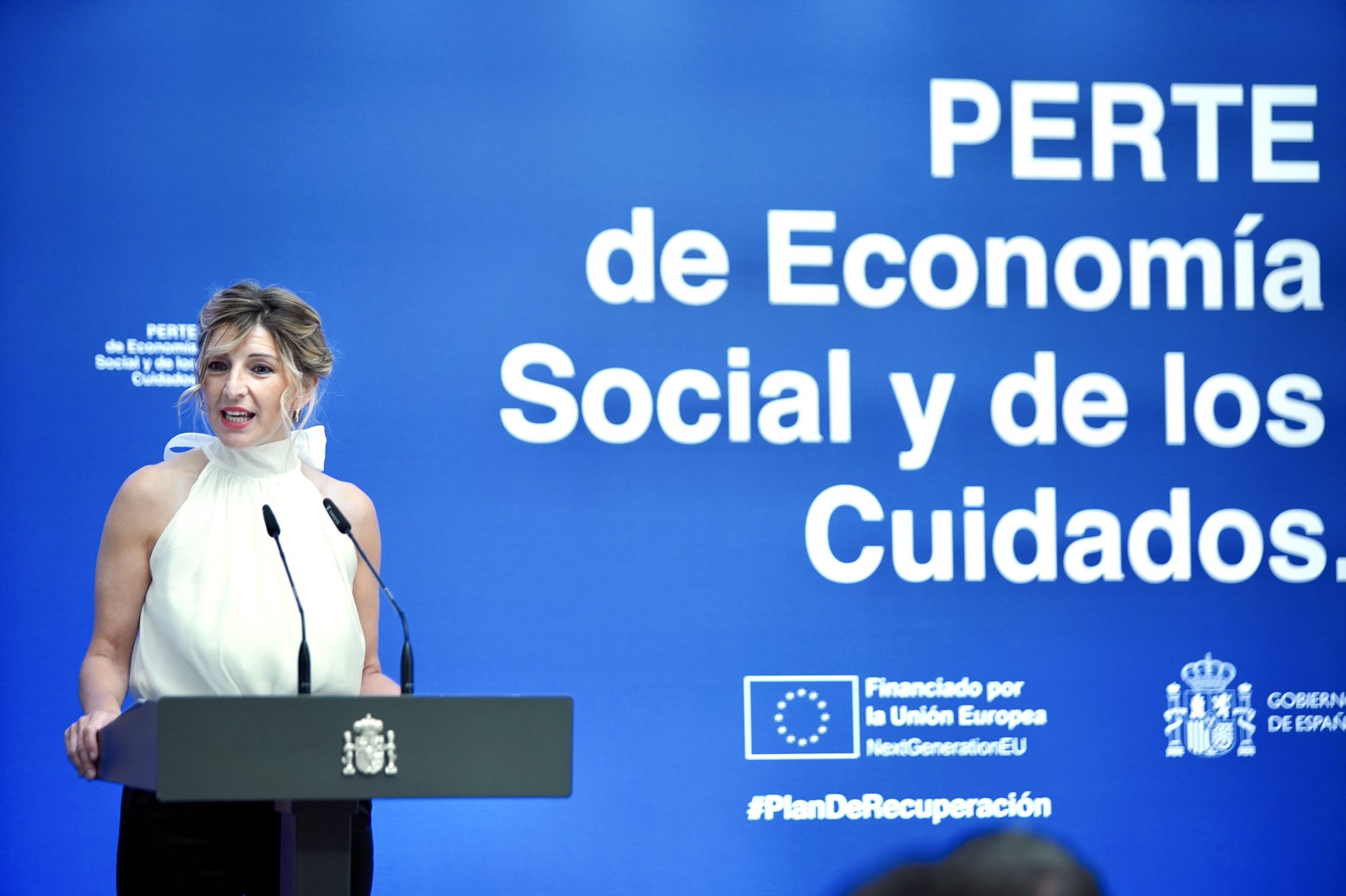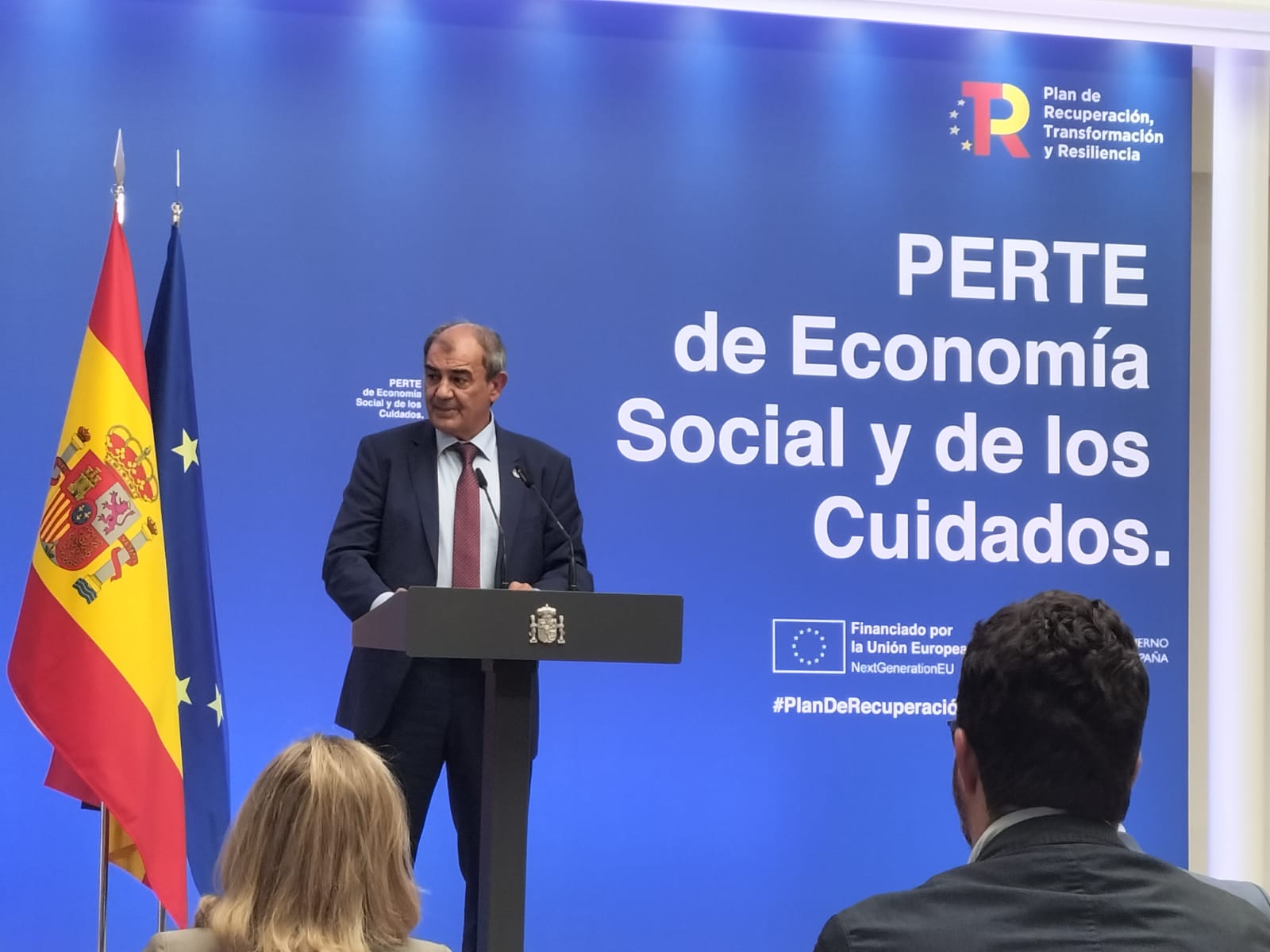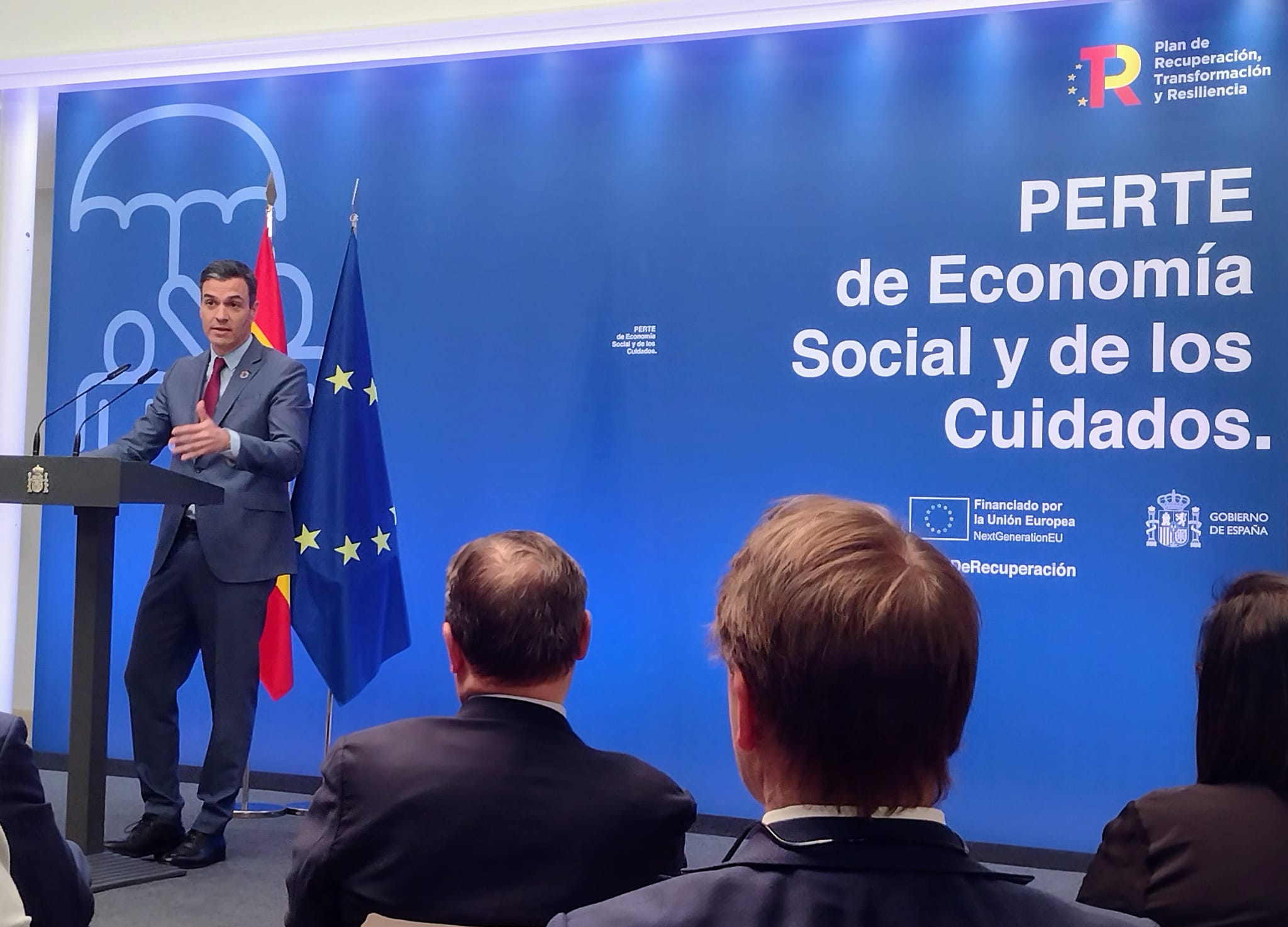THE SOCIAL ECONOMY WILL INCREASE ITS WEIGHT IN GDP BY UP TO 11% WITH THE PERTE STRATEGIC PLAN FOR THIS BUSINESS MODEL
27 05 2022
0 Comments
CEPES celebrates the PERTE of the Social Economy and Care, which has been presented this Friday by the President of the Government, Pedro Sánchez. According to the estimates of the employers of the Social Economy, this PERTE will increase the weight of this business model in GDP one point, going from the current 10% to 11%.
Latest news
27 December 2023
The Social Economy is the enterprise model with the greatest presence in rural areas and medium-sized cities and the greatest resilience to job destruction.
17 October 2023
CEPES proposes the creation of a Euro-Mediterranean strategy for the region's social economy enterprises and organisations.
25 January 2023
Madrid will host at IESE Business School the presentation of the study 'How partnerships strengthen the social economy'
·
In the words of the
President of the Government during the presentation of the PERTE this Friday:
"The strategic objective of this Government is to position the Spanish
social economy as a reference in Europe through a cutting-edge hub"
·
The second vice
president and Minister of Labor and Social Economy, Yolanda Díaz, declared that
"the social economy is a reference project for our country and in
Europe"
· The event was also attended by the president of CEPES, Juan Antonio
Pedreño; the president of Konfekoop, Rosa Lavín; and the president of COVIRAN,
Patro Contreras
· "This PERTE will be a fundamental instrument for the social economy to
change its scale, support its adaptation and leadership in new emerging sectors
through quality jobs and transformative projects in the territories," said
the president of CEPES
· The PERTE, the result of intense work in recent months, has been presented
this Friday in an act that has closed the President of the Government and will
be approved next Tuesday in the Council of Ministers. It will be endowed with
800 million euros, through 9 lines of action and will involve 12 ministries
Madrid, May 27,
2022.- The Spanish Business Confederation of the
Social Economy (CEPES) celebrates the PERTE of Social Economy and Care,
which has been presented this Friday by the President of the Government, Pedro
Sánchez. According to the estimates of the Employers, this PERTE will increase
the weight of this business model in GDP one point, going from the current 10%,
to 11%.
The presentation was
attended by the second vice president and Minister of Labor and Social
Economy, Yolanda Díaz; the president of CEPES, Juan Antonio Pedreño; the
president of Konfekoop, Rosa Lavín; and the president of COVIRAN, Patro
Contreras, in addition to the president of the government, who
closed the event.
 The event was also
attended by the First Vice President and Minister of Economic Affairs and
Digital Transformation, Nadia Calviño; the Ministers of the Presidency,
Relations with the Courts and Democratic Memory, Félix Bolaños; of
Health, Carolina Darias; of Social Rights and Agenda2030, Ione
Belarra; of Equality, Irene Montero; the head of
Inclusion, Social Security and Migration, José Luis Escrivá, the
Minister of Territorial Policy and Government Spokesperson, Isabel Rodriguez
and Luis Planas, Minister of Agriculture, Fisheries, Food and Environment.
The event was also
attended by the First Vice President and Minister of Economic Affairs and
Digital Transformation, Nadia Calviño; the Ministers of the Presidency,
Relations with the Courts and Democratic Memory, Félix Bolaños; of
Health, Carolina Darias; of Social Rights and Agenda2030, Ione
Belarra; of Equality, Irene Montero; the head of
Inclusion, Social Security and Migration, José Luis Escrivá, the
Minister of Territorial Policy and Government Spokesperson, Isabel Rodriguez
and Luis Planas, Minister of Agriculture, Fisheries, Food and Environment.
The PERTE
(Strategic Project for Economic Recovery and Transformation) of Social Economy
and Care will be endowed with 800 million euros, through 9 lines of
action, will involve 12 ministries and will be approved on Tuesday in the
Council of Ministers.
"This PERTE will
be a fundamental instrument for the social economy to change its scale,
support its adaptation and leadership in new emerging sectors through quality
jobs and transformative projects in the territories that respond to the
challenges of depopulation and demographic changes, relaunch new forms of
economy promoting inclusive and sustainable models and facilitating the
recovery of companies", said the president
of CEPES, Juan Antonio Pedreño.
According to
estimates by the employers, this PERTE will increase by 1% the weight of the
social economy in GDP, which currently accounts for around 10% of GDP,
represents more than 43,000 companies and more than 2.5 million jobs.
"Today opens an
ambitious stage for the social economy in Spain and also in Europe. Our country
takes a leap in quality in its permanent commitment to grow a business model
that is an essential part of the business and social fabric of Spain. Once again, Spain is leading the
development and promotion of the social economy in Europe," said Pedreño.
In addition, the
president of CEPES pointed out that this PERTE is "directly incardinated
with the objectives of the European Union and with the European Action Plan,
and invites Member States to use the Recovery and Resilience Mechanisms to
carry out reforms and business investments in the social economy".
Likewise, Pedreño
stressed that it is the first time that the social economy has in Spain a
financing instrument of such endowment and stressed the values of this
business model: "creation and maintenance of quality jobs, competitiveness
and social innovation, generation of greater cohesion in the territories and
correction of social inequalities and construction of sustainable and more
equitable societies in which no one is left behind".
 In relation to the
sector of the Care Economy, with which this PERTE of social economy
shares prominence, Pedreño said that "it is another great success, since
the social economy develops a fundamental role in a sector that will be key in
the coming years. It will contribute to digitizing and modernizing people´s
care by introducing sophisticated technology that gives a higher quality to
millions of people." "The social economy represents more than 43% of
the private supply of dependency care and other social services," he
concluded.
In relation to the
sector of the Care Economy, with which this PERTE of social economy
shares prominence, Pedreño said that "it is another great success, since
the social economy develops a fundamental role in a sector that will be key in
the coming years. It will contribute to digitizing and modernizing people´s
care by introducing sophisticated technology that gives a higher quality to
millions of people." "The social economy represents more than 43% of
the private supply of dependency care and other social services," he
concluded.
THE SPANISH SOCIAL
ECONOMY AS A BENCHMARK IN EUROPE
The President of
the Government, Pedro Sánchez, stressed that "this PERTE demonstrates the enormous interest of the Government of
Spain in the social economy and the transcendence of this project," said
Sánchez, and stressed that its strategic objective is "to position the
Spanish social economy as a reference in Europe through a cutting-edge
hub."
Of this business
model, he stressed that "it promotes community employment
and defends the interests of diverse groups." In
addition, he highlighted the dynamic capacity of the model in the national
economic fabric.
"The social
economy is present in each and every sector of our economy," he said.
Reason why the Executive has included among one of the priorities of the
Recovery, Transformation and Resilience Plan this sector, as well as the
importance of developing the care economy.
Sánchez said that
this PERTE is structured around two main objectives. The first of these
is to develop the potential of the social economy through the conversion of companies in crisis or with a lack of
generational change into social economy companies, as well as to promote
technology in this sector".
The second
objective is to strengthen the care economy, for which it is intended to
promote the qualification of professionals in the sector, promote collaborative
housing projects for people with special needs and promote technology in this
sector.

A WORK OF CONTINUITY
WITH THE MINISTRY OF LABOR AND SOCIAL ECONOMY
For her part, the second
vice president and Minister of Labor and Social Economy, Yolanda Díaz, declared
that "the social economy is a reference project for our country and in
Europe, it is an alternative project, a different country project. It is a
horizontal, inclusive economy, an economy that embraces, feminist, because it
takes care of projects and people. It´s the economy that cares about people in
our country´s especially depopulated and environmentally just places."
He also stressed that
the social economy is "resilient and especially democratic"
and explained the variety of companies that are part of the social economy
family: "to talk about social economy is to talk about legal forms
that are very close to us but that we often do not know, such as cooperatives,
fishermen´s guilds, labor societies, among others.
On the other hand, he
recalled that the Ministry is already working on three regulations that
affect the social economy. Specifically, in the amendment of
the Law on Cooperatives and the Law on Social Economy, as well as in the
modernization of the Law on Insertion Companies.
DIVERSITY OF THE
SOCIAL ECONOMY
The social economy
includes cooperatives, labour societies, mutual societies, insertion companies,
special employment centres, associations in the disability sector and
fishermen´s guilds.
During the
presentation on Friday, they intervened on behalf of the sector, in addition to
the president of the employers´ association, Juan Antonio Pedreño, the president
of Konfekoop (Confederation of Cooperatives of the Basque Country), Rosa Lavín,
and the presidentof the supermarket cooperative COVIRAN, Patro
Contreras.
For his part, Lavín
stressed the term ´company´ when talking about the social economy "because
we manage our businesses with all the business rigor knowing how to combine
economic profitability with efficiency and economic and social
resistance," he said.
"This PERTE will
be the lever to promote aging as an opportunity, give prestige to care,
activate public administrations to have a proactive and innovative attitude,
share and scale successful projects, provide professionals with strategic
skills with digital as a basis, and advance in public-private co-creation to
generate activity and employment. In short: build a country," he
concluded.
Contreras highlighted the values of equality and social justice that characterize the
social economy. "We are value-based companies whose objective is to
distribute the wealth generated in a much more equitable way. We believe in a
model based on the community, which serves its people and its environment and
that finds its strength in supporting those same people", he also
"stressed the importance of this business model in rural areas, offering
services and industry to areas, which would otherwise be abandoned, "he
stressed.
To access the publication, click
here: PERTE of the Social Economy and Care

